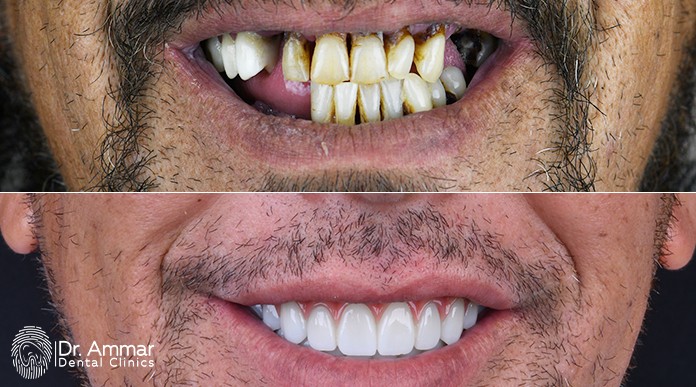Types of Dental Implants
Dental implants have revolutionized the field of restorative dentistry, offering a permanent solution for missing teeth. With advancements in dental technology, several types of dental implants are now available, each designed to cater to specific patient needs. Understanding the differences between these implant types can help you make an informed decision about your dental care.
Types of Dental Implants
There are 5 types of dental implants:
1. Endosteal Implants
Endosteal implants are the most common type of dental implants. They are surgically placed directly into the jawbone and are typically made of titanium or zirconia. These implants serve as a replacement for the root of a missing tooth and are suitable for patients with a healthy jawbone.
Benefits:
-
High success rate.
-
Durable and long-lasting.
-
Supports single or multiple crowns.
Considerations:
-
Requires sufficient jawbone density.
-
Multiple surgical procedures may be needed.
2. Subperiosteal Implants
Subperiosteal implants are placed under the gum tissue but on or above the jawbone. They are custom-made to fit the contours of the patient's jaw and are typically used for patients who do not have enough healthy jawbone and cannot undergo bone augmentation procedures.
Benefits:
-
Ideal for patients with insufficient bone height
-
No need for bone grafting.
Considerations:
-
Less stable than endosteal implants.
-
May not be suitable for all patients.
3. Zygomatic Implants
Zygomatic implants are the least common and most complex type of dental implants. Instead of being anchored into the jawbone, they are placed into the zygomatic bone (cheekbone). This type of implant is used for patients with severe bone loss in the upper jaw who cannot undergo bone grafting procedures.
Benefits:
-
Provides a solution for patients with significant bone loss.
-
Avoids the need for bone grafting.
Considerations:
-
Requires specialized surgical expertise.
-
Higher risk of complications.
4. All-on-4 Implants
The All-on-4 implant technique involves placing four dental implants in the upper or lower jaw to support a full arch of replacement teeth. This approach is ideal for patients who have lost most or all of their teeth and want a fixed, non-removable solution.
Benefits:
-
Provides a full set of teeth with only four implants.
-
Shorter treatment time compared to traditional implants.
-
Immediate loading options are available.
Considerations:
-
Requires sufficient bone density
-
Not suitable for all patients
5. Mini Implants
Mini dental implants are smaller in diameter than standard implants and are used to stabilize dentures or replace small teeth. They are less invasive and typically require a shorter recovery time.
Benefits:
-
Less invasive procedure.
-
Shorter recovery time.
-
Cost-effective solution.
Considerations:
-
Not suitable for all patients.
-
May not be as durable as standard implants.
Benefits of Dental Implants
Dental implants offer numerous advantages over traditional tooth replacement options like dentures and bridges. Some of the key benefits include:
-
Enhanced Appearance: Implants are designed to look and feel like your natural teeth, improving your smile and facial aesthetics.
-
Improved Speech: Unlike ill-fitting dentures, implants allow you to speak without the worry of slipping, enhancing communication.
-
Better Comfort: Since they become a part of you, implants eliminate the discomfort associated with removable dentures.
-
Easier Eating: Implants function like natural teeth, allowing you to enjoy your favorite foods without pain or discomfort.
-
Durability: With proper care, dental implants can last a lifetime, making them a cost-effective solution in the long run.
-
Bone Preservation: Implants help prevent bone loss in the jaw by stimulating bone growth, maintaining facial structure.
When One Needs a Dental Implant
Dental implants are considered when:
-
Missing Teeth: If you have lost a tooth due to injury, decay, or disease, implants can restore your smile.
-
Loose or Ill-Fitting Dentures: Implants can provide a stable foundation for dentures, improving comfort and function.
-
Difficulty Chewing: Missing teeth can make chewing difficult; implants restore full chewing ability.
-
Jawbone Loss: Implants help prevent further bone loss in the jaw, maintaining facial structure.
-
Desire for Permanent Solution: If you're looking for a long-term solution to missing teeth, implants are a durable choice.
At Dr. Ammar Dental Clinics, our experienced implant specialists carefully assess each case to provide the most suitable and long-lasting solution tailored to your needs. With advanced technology and a patient-focused approach, we ensure safe, precise, and comfortable implant procedures.
Restore your smile and confidence today—schedule your consultation with Dr. Ammar Dental Clinics, one of the leading centers for dental implants in Egypt.

